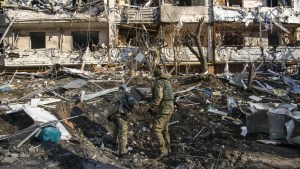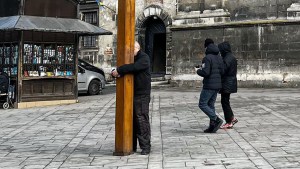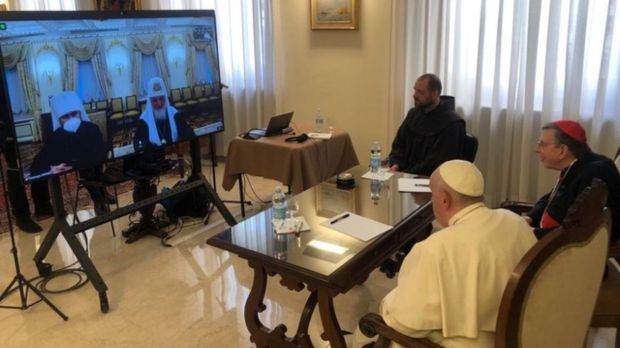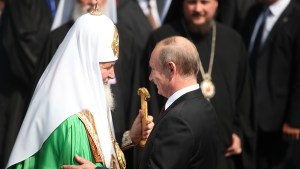When Pope Francis met with the Russian Orthodox leader, Patriarch Kirill of Moscow, the Holy Father told the Patriarch, “There was a time, even in our Churches, when people spoke of a holy war or a just war. Today we cannot speak in this manner. A Christian awareness of the importance of peace has developed.”
Traditional Catholic theology proposes several terms, based on the principle of self-defense, wherein a country could, justly, engage in war. These principles, referred to as “just war theory” are found in the great theologians of the West like St. Thomas Aquinas and St. Augustine of Hippo. They have guided the Church’s response to war for centuries.
The Catechism of the Catholic Church enumerates the following foundational principles of traditional just war theory:
The strict conditions for legitimate defense by military force require rigorous consideration. The gravity of such a decision makes it subject to rigorous conditions of moral legitimacy. At one and the same time: (1) the damage inflicted by the aggressor on the nation or community of nations must be lasting, grave, and certain; (2) all other means of putting an end to it must have been shown to be impractical or ineffective; (3) there must be serious prospects of success; (4) the use of arms must not produce evils and disorders graver than the evil to be eliminated. (Para. 2309)
For the Church, a war is moral, ethical, by satisfying these four criterial of just war theory, despite the fact that many may be killed. Those casualties may even include combatants and civilians. By applying these principles the Church determines whether or not a war is justifiable, given the particularities of the present moment.
Pope Francis believes it is difficult, perhaps impossible, to satisfy the criteria of just war theory today. He believes that the risk of war outweighs its benefits. In his encyclical letter Fratelli Tutti, he writes, “We can no longer think of war as a solution, because its risks will probably always be greater than its supposed benefits. In view of this, it is very difficult nowadays to invoke the rational criteria elaborated in earlier centuries to speak of the possibility of a ‘just war.'”
These traditional criteria, which are again grounded in the idea that a person or nation has a right to self defense, I think retain a perennial validity and help us to determine when military force, especially for the protection of innocents, is legitimate and illegitimate. I do not, therefore, think it is in the best interest of our theology to set aside these categories.
However, after having visited all of the border crossings on the Polish-Ukrainian border and seeing the crisis caused by the war, I deeply sympathize with Pope Francis’s sentiment.
The needless war is a work of hell itself.
The needless war is a work of hell itself. Nearly one thousand civilians have died. The ten million displaced people, including millions who have fled Ukraine, attest to the pointless destruction of cities and homes. The separation of families – a particularly demonic work – has left children’s futures uncertain, where there was once stability and peace.
Many news outlets, humanitarian organizations and corporations are referring casually to “the situation” or “the crisis” in Ukraine. What we’re seeing now is no mere humanitarian crisis. The millions of refugees fleeing Ukraine aren’t running from the aftermath of a natural disaster or a civil crisis, like an explosion caused by a gas leak or a building collapse. It is a war, pure and simple.
The Pope is right, then, to point out the injustice of it all. Pope Francis says, “Wars are always unjust, since it is the people of God who pay. Our hearts cannot but weep before the children and women killed, along with all the victims of war.” These little ones are the ones who suffer.
We needn’t conclude that the Pope has abrogated the idea of legitimate self defense in order to sympathize with his claim that in a war those who suffer most are innocents. Pope Francis recently said,
The war is not far away: it is at our doorstep. What am I doing? Here in Rome, at the “Bambino Gesù” Hospital, there are children wounded by the bombings. At home, they take them home. Do I pray? Do I fast? Do I do penance? Or do I live carefree, as we normally live through distant wars? A war is always – always! – the defeat of humanity, always. We, the educated, who work in education, are defeated by this war, because on another side we are responsible. There is no such thing as a just war: they do not exist!
Faced with the radically unjust evil of war, we must redouble our efforts to work for peace.




